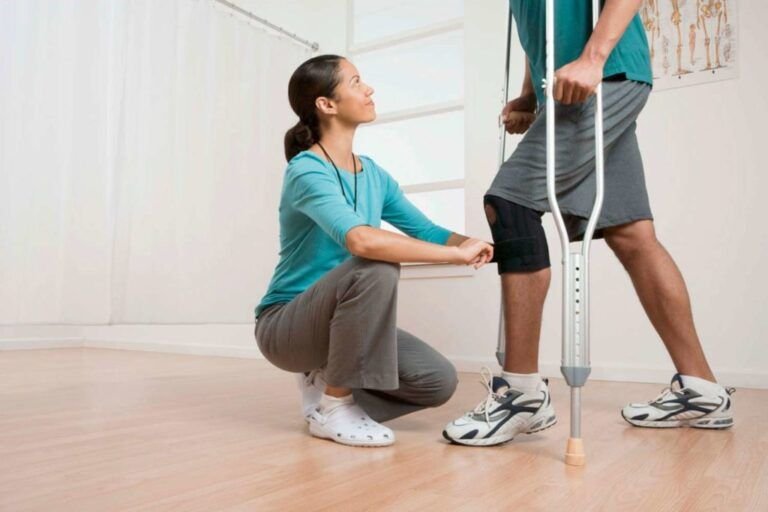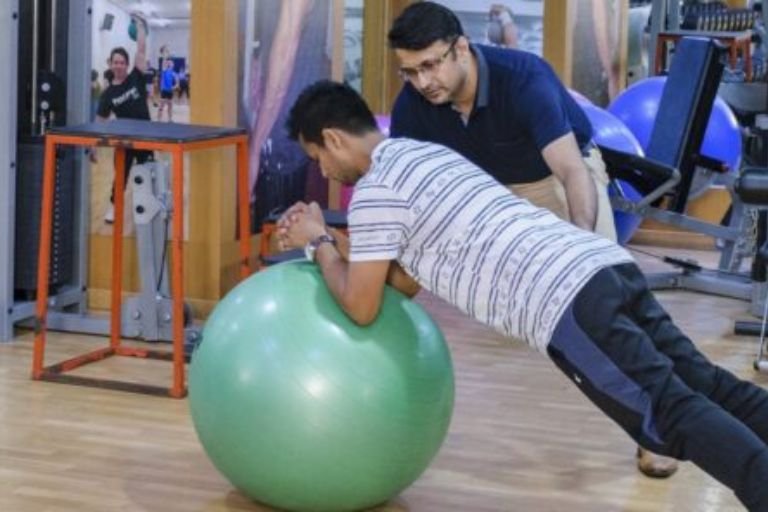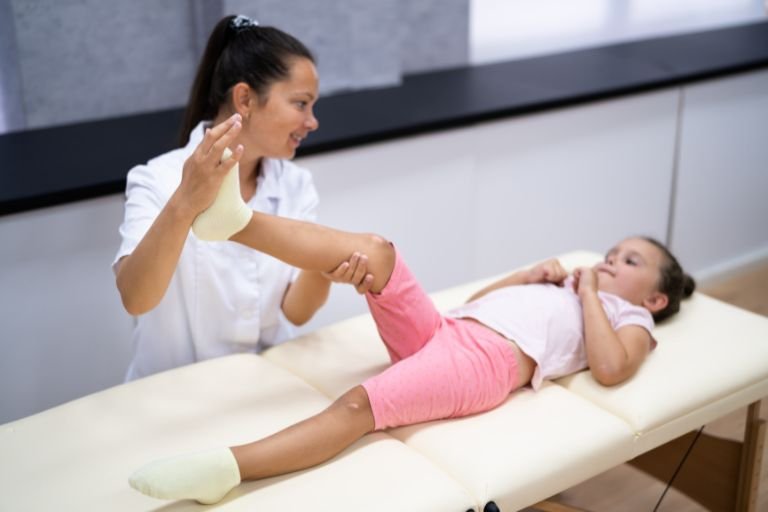- Fitwell Physiotherapy
Neurological Physiotherapy

Neurological physiotherapy, also known as neurophysiotherapy, is a specialized area of physiotherapy that focuses on the assessment and treatment of individuals with neurological conditions affecting the central nervous system (brain and spinal cord). These conditions may result from injury, disease, or dysfunction of the nervous system and can lead to various physical impairments, functional limitations, and disabilities. Neurological physiotherapists work collaboratively with patients to improve movement, function, and overall quality of life through targeted rehabilitation interventions.
Please submit your details below.
Conditions Treated by Neurological Physiotherapy:
- Stroke: Stroke is a leading cause of neurological disability worldwide, often resulting in hemiparesis (weakness on one side of the body), impaired mobility, balance deficits, and coordination problems. Neurological physiotherapy focuses on retraining movement patterns, restoring motor function, and promoting recovery of independence in activities of daily living (ADLs) following a stroke.
- Traumatic Brain Injury (TBI): Traumatic brain injury can lead to a range of physical, cognitive, and behavioral impairments, including motor dysfunction, balance disturbances, spasticity, and cognitive deficits. Neurophysiotherapy interventions aim to improve mobility, gait, coordination, and functional independence while addressing secondary complications such as muscle contractures and pressure sores.
- Spinal Cord Injury (SCI): Spinal cord injury can result in paralysis or loss of sensation below the level of injury, affecting mobility, sensation, bladder and bowel function, and autonomic regulation. Neurological physiotherapy focuses on optimizing physical function, promoting neuroplasticity, managing secondary complications, and enhancing quality of life for individuals with SCI.
- Multiple Sclerosis (MS): Multiple sclerosis is a chronic autoimmune disease that affects the central nervous system, leading to a variety of neurological symptoms such as weakness, spasticity, fatigue, and gait disturbances. Neurophysiotherapy interventions aim to address mobility limitations, fatigue management, balance impairments, and functional deficits associated with MS.
- Parkinson’s Disease (PD): Parkinson’s disease is a progressive neurodegenerative disorder characterized by motor symptoms such as bradykinesia (slowness of movement), tremor, rigidity, and postural instability. Neurological physiotherapy focuses on improving mobility, balance, posture, and functional independence while addressing gait disturbances and fall risk in individuals with PD.
- Cerebral Palsy (CP): Cerebral palsy is a group of permanent movement disorders that appear in early childhood, resulting from abnormal development or damage to the immature brain. Neurophysiotherapy interventions aim to optimize motor function, improve muscle tone and flexibility, enhance mobility and independence, and address associated impairments such as contractures and scoliosis.
- Peripheral Nerve Injuries: Peripheral nerve injuries, such as brachial plexus injury or peripheral neuropathy, can lead to weakness, sensory deficits, and impaired motor function in the affected limbs. Neurological physiotherapy focuses on restoring strength, sensation, coordination, and function through targeted exercises, manual therapy, and neuromuscular re-education.
Treatment Approaches in Neurological Physiotherapy:
- Neurodevelopmental Treatment (NDT): NDT is a hands-on approach to neurological rehabilitation that focuses on facilitating normal movement patterns, postural alignment, and motor control through guided movement and handling techniques.
- Bobath Concept: The Bobath Concept is a holistic approach to neurological rehabilitation that emphasizes the integration of sensory, motor, and cognitive components to improve movement quality, functional abilities, and participation in daily activities.
- Task-Specific Training: Task-specific training involves practicing functional tasks and activities relevant to the individual’s goals and daily life, with the aim of improving motor learning, coordination, and functional independence.
- Strength and Conditioning: Strength and conditioning exercises are used to improve muscle strength, endurance, and power in individuals with neurological conditions, helping to optimize physical function, mobility, and overall health.
- Balance and Vestibular Rehabilitation: Balance and vestibular rehabilitation programs focus on improving balance, stability, and postural control through specific exercises, sensory integration techniques, and balance training devices.
- Gait Training: Gait training programs aim to improve walking ability, gait mechanics, and efficiency through treadmill training, overground walking practice, gait retraining strategies, and use of assistive devices such as walkers or orthoses.
- Functional Electrical Stimulation (FES): FES involves the application of electrical stimulation to muscles or nerves to elicit muscle contractions and facilitate movement in individuals with neurological deficits, such as foot drop or muscle weakness.
Why Choose Neurological Physiotherapy:
- Expertise and Specialization: Neurological physiotherapists have specialized training and expertise in assessing and treating individuals with neurological conditions, ensuring high-quality care and optimal outcomes.
- Individualized Care: Treatment plans in neurological physiotherapy are tailored to each individual’s unique needs, goals, and functional abilities, promoting personalized rehabilitation and maximizing potential for recovery.
- Multidisciplinary Collaboration: Neurological physiotherapists collaborate closely with other healthcare professionals, including neurologists, occupational therapists, speech therapists, and rehabilitation specialists, to provide comprehensive care and support for individuals with neurological conditions.
- Holistic Approach: Neurological physiotherapy takes a holistic approach to rehabilitation, addressing physical, cognitive, emotional, and social aspects of well-being to promote overall health, function, and quality of life.
- Evidence-Based Practice: Treatment approaches in neurological physiotherapy are based on the latest research evidence and best practice guidelines, ensuring the most effective and up-to-date interventions for individuals with neurological conditions.
Frequently Asked Questions
Neurological physiotherapy focuses on the treatment of individuals with neurological conditions that affect the nervous system, such as the brain, spinal cord, and peripheral nerves. It helps improve movement, balance, coordination, strength, and overall function, enhancing the quality of life for individuals with neurological disorders.
Neurological physiotherapy treats conditions including stroke, multiple sclerosis (MS), Parkinson’s disease, spinal cord injuries, traumatic brain injuries, cerebral palsy, Guillain-Barré syndrome, and other neurological disorders.
During your first appointment, the physiotherapist will conduct a comprehensive assessment, which includes reviewing your medical history, discussing your symptoms and goals, and performing physical tests to evaluate your movement, strength, balance, and coordination. Based on this assessment, they will develop a personalized treatment plan tailored to your needs.
Neurological physiotherapy can significantly aid stroke recovery by helping to restore movement, improve balance and coordination, reduce spasticity, and enhance overall functional abilities. Through targeted exercises, gait training, and task-specific practice, physiotherapists help stroke survivors regain independence and improve their quality of life.
Our clinic offers specialized neurological physiotherapy services provided by experienced therapists who are trained in the latest techniques and approaches for treating neurological conditions. We provide personalized treatment plans, a supportive and compassionate environment, and a commitment to helping you achieve your rehabilitation goals and improve your daily living activities.
How Fitwell Physiotherapy Can Help?
Dr. Richa’s Fitwell physiotherapy has an extensive team of physiotherapists all within their own specialist areas of physiotherapy. Whatever your condition, we guarantee that we will have the best physiotherapist for you. We assess, diagnose, plan, cure and care for you.
Fitwell Physiotherapy Clinic, Pune provides you best physiotherapy treatment in Kharadi, pune. We also serve Chandan Nagar, Vadgaon Sheri, Keshav Nagar, Wagholi & nearby Areas in Pune. We are experts in treating Neck Pain, Hand Pain, Back Pain, Lower Back Pain, Knee Pain, Stiff Neck, Sciatica, Arthritis, Stroke Paralysis & Post Surgical Rehab.
We provide Specialized physiotherapy treatments in Sports Injuries, Pre and post Surgery, Neurologic, Pediatric, Chronic Pain/Fatigue, Rheumatology, Women’s Health, Men’s Health, Ergonomics, Vestibular, Amputees & all sort of Pain treatment and lifestyle conditions.




















